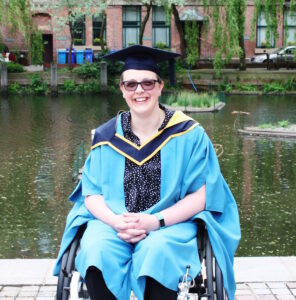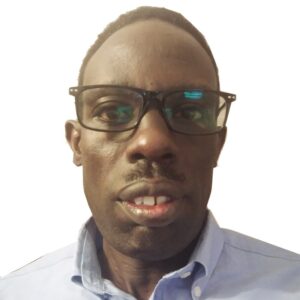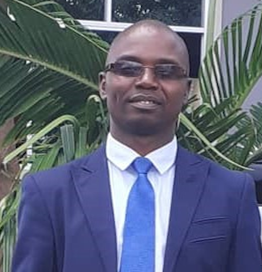Nicki Berry, Head of Accessibility for a major UK Government department and 2017 MAODE graduate, explains how her MAODE not only gave her the opportunity to study in a way that worked with her accessibility needs, but also brought her a whole new career!

Nicki writes:
I was a teacher. It was all I’d ever wanted to do, and I loved it. That was until I had a spinal cord injury whilst living in Finland in 2012. That changed everything.
We returned to the UK, and I tried to continue teaching but it was just too difficult as a newly disabled person, and I realised that I had to find an alternative career. As my other passion was IT, I explored the possibility of moving into eLearning, and began studying for the MAODE in 2014.
Having struggled to get through university as a young person, I was surprised to find that I really enjoyed studying again. The style of learning with the Open University suited my learning style well and as well as learning the course content, I learned how to study effectively and how to write academic papers. I had expected the course to be a means to an end, but it opened up a whole new world to me, which also helped me to come to terms with my disability. I was assessed as a disabled student to find out whether assistive software could help me in my studies, and was given Dragon Naturally Speaking, a voice recognition software to help with dictating assignments.
I graduated in 2017, by which time I was working as an Area Manager for our local authority’s Adult Learning Service. As a result of my new MAODE qualification, the senior managers there created a new position for me, as Area Manager – Digital. I took on responsibility for improving the entire IT hardware across the estate, and then began to explore the possibility of providing some of our courses online. This was pre-Covid though, and although there was initial interest, the organisation wasn’t ready for it. So, slightly disheartened, I began to look for a job in eLearning.
In January 2019, I began work as a Junior eLearning Designer for SSCL, a company that provide services for government departments. I started learning to use Articulate 360, one of the eLearning rapid authoring tools, along with Adobe Creative Cloud. I loved my new role and enjoyed immediate success, being promoted within five weeks to Senior eLearning Designer. I managed our contract with the Ministry of Justice, providing bespoke eLearning products for HM Prison and Probation Service, which is possibly one of the most interesting and eye-opening jobs I have ever done. I absolutely loved it! I thought I’d found my new career.
One of the first things SSCL asked me to do, when I started there, was to look into the accessibility of eLearning courses. It was fortunate that I’d had an introduction to accessibility as part of the MAODE course. By now, I had also become proficient in using my Dragon software, using it to operate my computer and navigate the Internet, as well as for producing text. So I began to learn about the Web Content Accessibility Guidelines and how to apply them to eLearning courses. I learned how to use a screen reader to test our products and over a couple of years, developed expertise not just with eLearning accessibility but also document and web accessibility.
I began to realise the importance of accessibility in product design of all kinds, not just eLearning, and took on the role of Chair of our Disability Network. I pushed for a new, full-time role to be introduced, but again, they weren’t ready for this and I started to look into accessibility roles in other companies, to demonstrate its importance.
That was when I saw the advert for a Senior Accessibility Specialist with the Department for Work and Pensions (DWP). It was just what I was looking for to show SSCL what I felt they should be doing… but then I realised that the job advertised was exactly what I wanted to be doing.
So in January 2022, I moved into accessibility as a career. I had a great boss, who taught me even more about legislation, accessibility compliance, assistive software and coding. I felt like I’d finally found my niche. When my boss got another job at the end of 2022, I was initially really worried, but he encouraged me to apply for the temporary backfill of his role. I did and that’s what I’m doing now. I’m Head of Accessibility for DWP. It is possibly the most rewarding job I could have imagined after more than 20 years in teaching. However, it is also extremely challenging and I often find myself drawing on skills that I learned and developed with the OU, whilst studying for the MAODE.
Let’s talk finances for a moment. When I began my studies, I’d just left the only secure career I’d ever known. I was doing little bits of tuition here and there but I had no guaranteed income. Setting out on the course was a huge financial commitment! It was a risk. I might not have passed. It might not have led to anything. It might have been £10,000 for nothing. When I started work in Adult Learning, my salary compared to a teaching salary was low. The initial move to SSCL was another backwards step financially, though the quick promotion helped. However, moving to DWP took me back to where I would have probably been if I’d stayed in education and continued to pursue a leadership path… and now, I’ve probably gone beyond that.
Money isn’t everything, but investing thousands of pounds in study is definitely a risk. I approached it with the view that I had very little to lose. My career was over. It was a sink or swim situation.
I look back and with so much gratitude, realise that the MAODE got me swimming again. It wasn’t just the course content, great as that was. Studying gave me confidence, made me believe in myself again. I thought my life was over, I had nothing to give anymore. The OU gave me new skills that have been instrumental in rebuilding my life.
I wake up every morning, happy to start work. I feel like I have a purpose. If I could turn back time and not injure my back, of course I would be very grateful, but with help, I have turned it into something positive. I can use it to help others and to advocate for the many disabled people who aren’t as lucky as I am.
Interested in finding out more about The Open University’s Masters in online teaching?
In 2023 we launched the OU’s new Masters in Online Teaching, an innovative postgraduate programme exploring the ways that new media, digital pedagogies and cutting-edge educational technologies can be used effectively and equitably, across multiple sectors, to engage diverse learners and meet their needs. The programme offers flexible study pathways featuring a choice of topics, study intensity and study timing, and the option to include credit from a select postgraduate microcredentials. One of these new MAOT micro-credentials ‘Online Teaching: Accessibility and Inclusive Learning‘ focuses on the kind of issues Nicki has become expert in during her recent career, including Assistive Technologies, accessibility legislation, making learning materials accessible, and evaluating the accessibility of teaching materials.
Find out more about the OU’s MA In Online Teaching here.




